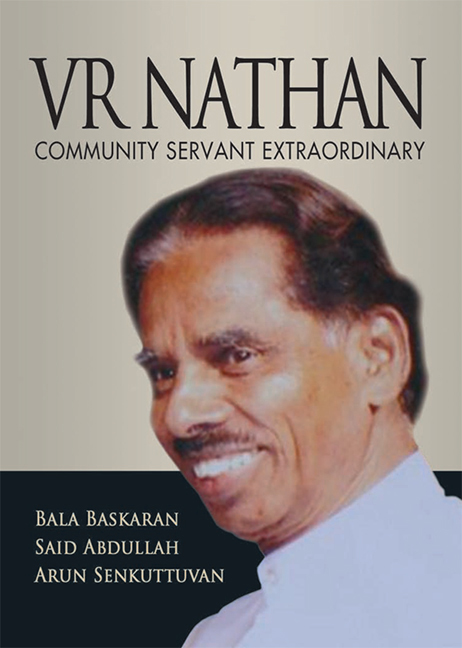Book contents
- Frontmatter
- Contents
- Foreword
- Message
- Preface
- Acknowledgements
- 1 VR's Inter-religious Leadership
- 2 An Immigrant who Made Good
- 3 Introduction to Temple Management Affairs
- 4 Invitation to Help out HEB
- 5 An Era of Change in HEB
- 6 VR's Signal Contribution to HEB's Transformation
- 7 Celebrating Hindu Festivals
- 8 Transforming the Temple Scene
- 9 VR's Views in Public Deliberations of Issues Affecting Indians
- 10 VR's Legacy
- Appendix
- About the Authors
- Plate section
1 - VR's Inter-religious Leadership
Published online by Cambridge University Press: 21 October 2015
- Frontmatter
- Contents
- Foreword
- Message
- Preface
- Acknowledgements
- 1 VR's Inter-religious Leadership
- 2 An Immigrant who Made Good
- 3 Introduction to Temple Management Affairs
- 4 Invitation to Help out HEB
- 5 An Era of Change in HEB
- 6 VR's Signal Contribution to HEB's Transformation
- 7 Celebrating Hindu Festivals
- 8 Transforming the Temple Scene
- 9 VR's Views in Public Deliberations of Issues Affecting Indians
- 10 VR's Legacy
- Appendix
- About the Authors
- Plate section
Summary
When the post-Independence history of Singapore's Inter-Religious Organization is written three names will stand out: Lee Bock Guan, VR Nathan and Haji Abu Bakar Maidin. Lee is president of the Buddhist Lodge. VR was the longest-serving chairman of the Hindu Endowments Board, and Bakar the longest-serving president of Jamiyah or the Muslim Missionary Society. In an interview for this book, Rustom M Ghadiali, president of the Parsi Zoroastrian Association, who had worked with them for many years, said: “They were like brothers.” There was nothing trite in Ghadiali's description of the three men. It was a sincere description of the friendship between the three which came through in interviews with Lee and Bakar.
VR had known Bakar since the late sixties when they both worked in the same building – Shaw House at the corner of Orchard and Scotts Roads. A few years later, Bakar became president of Jamiyah and they lost touch. VR was busy with his career and Bakar was immersed in Jamiyah with a missionary zeal. Their paths crossed again when VR got involved in IRO affairs first as a mediator and then as a Hindu representative and as someone who knew the government's expectations.
It was the latter part of VR's credentials that made key members of IRO approach him in 1995 to resolve an issue that had been bugging IRO for some time – whether to admit the Baha'is into the organization. The Muslims already active on IRO did not want them included as it would be interpreted to mean that they were recognizing them as a separate sect or religion. Given what the Baha'is professed, those Muslims felt that their religion did not permit such acceptance. Representatives of other religions on IRO did not want to sit in judgment but at the same time felt that they could not simply ignore the Baha'is’ application. They consulted VR. He told them: Admit the Baha'is. A number of Muslims resigned from IRO, but soon the organization was stabilized. In the process, Bakar got to appreciate VR for what he was – a cosmopolitan who cared about religious harmony in Singapore. VR got to know Bakar as one who took his mission seriously and who would not hesitate to seek anyone's support to carry out his missionary work.
- Type
- Chapter
- Information
- VR NathanCommunity Servant Extraordinary, pp. 1 - 19Publisher: ISEAS–Yusof Ishak InstitutePrint publication year: 2012

